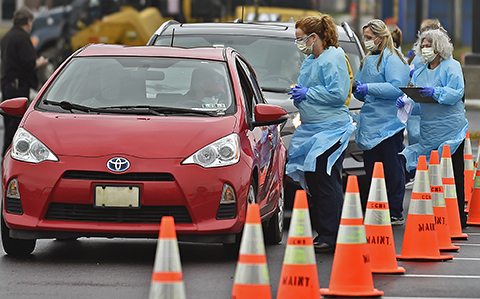 Global manufacturing sinks to lowest level since 2009
Global manufacturing sinks to lowest level since 2009
In February, the JPMorgan Global Manufacturing PMI fell 3.2 points to 47.2, as the coronavirus disrupted supply chains, trade and overall demand. Manufacturing in the U.S. actually expanded, but with 50.1 percent, the expansion was by the slimmest of margins. New export orders fell to the lowest since 2009.
Banks weathering the storm, so far
It’s been a dozen years since U.S. banks weathered the storm of the financial crisis and widespread loan defaults. During those 12 years, banks saw a collapse in energy markets (2016), few economic development projects (2007 to 2009), low interest rates and some stock volatility. Today they are experiencing all of the above. It will be interesting to see how they fare next quarter through these issues, compounded by the coronavirus.
FDI expected to be reduced dramatically because of coronavirus
The Wall Street Journal reported in March: “Businesses will likely cut their overseas investments by between 5 percent and 15 percent this year in response to the coronavirus outbreak, but there may also be a longer lasting movement of production back to their home countries, the United Nations said.” The article reported that businesses will hold back on planned investments in countries hit hard by the virus, such as the U.S., Italy, China, Japan and Korea.
Eleven-year bull market ends
In March, the stock market plunged 20 percent (it would drop more later in the month) ending one of the longest winning streaks in market history. A 20 percent loss from previous highs defines a bear market.
U.S. population growth in 2019 was the lowest in a century
The annual population growth in the U.S. in 2019 was the lowest in 100 years. Population growth in 2019 was one half of 1 percent, lower growth than during the Great Depression in the 1930s, according to the Census. The U.S. population only grew by 1.5 million in 2019.
Federal Reserve: Tariffs a drag on manufacturing
A report written by Aaron Flaaen and Justin Pierce of the Federal Reserve showed that President Trump’s tariffs have led to job losses in the manufacturing sector and higher prices for producers and consumers. The researchers state, “Our results indicate that tariffs have been a drag on employment and have failed to increase output.” They concluded, “There are virtually no modern episodes of a large, advanced economy raising tariffs in a way comparable to the U.S. in 2018-2019.” A similar report by the Fed, Princeton University and Columbia University said that the tariffs implemented in 2018 cost Americans as much as $1.4 billion per month.
Fed report says tariffs have backfired
A Federal Reserve report that came out in December laid out the claim that American tariffs imposed by President Trump have hurt American manufacturing. The protectionist policies have slowed manufacturing as well as the overall economy, the report stated. In 2019, economic growth decelerated from 3 percent at the beginning of the year to 2 percent.
Retailers want Trump to dump the tariffs
The coronavirus crisis on top of Trump’s tariffs is making some U.S. retailers demand the tariffs be removed. President Trump has hiked tariffs for Chinese goods from 3.1 percent at the start of 2018 to 19.3 percent as of the winter quarter, according to the Peterson Institute for International Economics. No, China is not paying for these tariffs. End users of Chinese goods here in the U.S. are paying for the tariffs. China has responded to Trump’s tariffs on Chinese goods and in turn has placed tariffs of 8 percent to 20.3 percent during the same period. In an interview with CNBC, Steve Lamar, president and CEO of the American Apparel and Footwear Association, said that the shoe industry in the U.S. paid about $3.5 billion in tariffs in 2019 that they didn’t pay in 2016. Lamar said, “One of the things we’ve been asking the president to do is ‘if you’re looking for an immediate way of injecting capital back into the system, get rid of those tariffs that are currently weighing us down.’ ”
 Coronavirus might devastate the auto industry
Coronavirus might devastate the auto industry
How badly will the coronavirus affect the automotive industry? As of mid-March, most automotive plants in the U.S. have temporarily closed. Analysts are predicting that, depending on the length of the pandemic, sales of light vehicles like SUVs, sedans and pickup trucks could drop between 3 percent and 15 percent. There’s more. With the cancellation of large-scale events, automakers are losing millions of dollars in advertising opportunities.
Panic has lessened global demand for oil and gas; U.S. frackers freaked
The coronavirus has affected all kinds of industry, particularly the travel industry. We have seen commodities crushed as of mid-March. Precious metals are down, including gold. Bitcoin is down and even palladium, everyone’s favorite metal that had been rising to historical heights, is cratering. But one major U.S. industry has seen a dramatic fall — oil. Combined with a flood of crude from Saudi Arabia and Russia, the virus has cut demand dramatically. A barrel of Brent crude was near $60 in mid-February. By mid-March, it was below $35 a barrel. The drop in price will cause widespread layoffs in the shale industry in Texas and elsewhere. Undoubtedly, there will be bankruptcies in the industry nationwide.
Milken Institute’s “Best Performing Cities”
The Milken Institute came out with its 2020 “Best Performing Cities” ranking in the winter quarter. San Francisco was ranked No. 1, followed by Provo, Utah. But several cities in the South made the top 10, including Austin (3); Orlando (5); Dallas-Plano-Irving (9) and Palm Bay-Melbourne-Titusville, Fla. (10).
 If the Supreme Court allows worker authorization for Dreamers to cease, jobs will be lost
If the Supreme Court allows worker authorization for Dreamers to cease, jobs will be lost
If the Supreme Court ends Deferred Action for Childhood Arrivals, or DACA, Florida could lose 24,000 jobs a month according to FWD.us. Three quarters of DACA job losses would be concentrated in 12 states.
FCC’s broadband data challenged
The Federal Communications Commission estimates that 21 million Americans, or just 6.5 percent of the population, lack access to high-speed internet, or broadband. However, new data, crowd sourced from an app that tests internet connectivity speeds, found that 65 percent of counties across the United States are averaging connection speeds slower than the FCC’s definition of broadband.
U.S. manufacturing closed out December with worst reading since June 2009
Even before the coronavirus outbreak, manufacturing in the U.S. saw its fifth consecutive month of contraction in December. There is no question that after the outbreak of the virus, manufacturing is probably in a deep recession. The Institute for Supply Management’s purchasing managers’ index fell to 47.2 in December from 48.1 in November. December’s performance was the worst score since June 2009, and it marked the eighth decline in the last nine months.
In the face of coronavirus, manufacturing actually expanded in February
According to the Institute for Supply Management’s measurements of industry activity, U.S. manufacturing actually expanded ever so slightly in February. We all know that will not be the case in March and probably April. February’s manufacturing PMI was 50.1 percent, down from January’s 50.9 percent. Any number over 50 indicates manufacturing expansion. In March, several CEOs said that the coronavirus was wreaking havoc on the electronics industry.
New census figures show population keeps shifting from the North to the South
The Census Bureau released new data in the winter quarter that shows population continues to shift from the Midwest and Northeast to the South and Southwest, which has been going on for decades. Congressional seats and electoral votes are allocated to states based on a census conducted every 10 years. Because the 2019 estimates come less than a year before the next decennial census, they closely approximate which states will gain and lose as a result of the 2020 count that gets fully underway in the spring. According to the data, Texas is expected to gain two congressional seats and Florida and North Carolina are expected to gain one. Eight states are likely to lose one seat and New York, Illinois, Michigan and California are in that mix. It would be California’s first loss since it became a state in 1850.
North Carolina and Texas at top of Forbes’ “Best States for Business”
In the winter quarter, North Carolina was named the No. 1 state for business by Forbes. Texas came in second and Virginia, Florida, Georgia and Tennessee made the top 10 in the South. Utah, Washington, Colorado and Idaho also made up the top 10.
Google to locate first U.S. operations center in Mississippi
In December, Google announced it was locating its first U.S. operations center in Northwestern Mississippi, although the exact location was not disclosed. Google’s current operations centers are located in India and the Philippines. The project will create 350 jobs that will provide customer service to Google users.
Seven Southern markets make top 10 for manufacturing jobs
Greenville, N.C.; Elizabethtown-Fort Knox, Ky.; Spartanburg, S.C.; Jonesboro, Ark.; Morristown, Tenn.; Greenville-Anderson-Mauldin, S.C.; and Athens-Clarke County, Ga., made SmartAsset’s Best Places to Work in Manufacturing ranking that came out in the winter.
The American South was the only U.S. region to see positive existing home sales in 2019
The South saw a 2.2 percent increase in 2019 in existing home sales, according to the National Association of Realtors. The West saw a decrease of 1.8 percent, the Midwest a decline of 1.6 percent and the Northeast saw a flat rate in 2019.
U.S. Space Command to re-open headquarter site search
On March 4, Air Force Secretary Barbara Barrett told lawmakers that the selection of a headquarters for the newly formed U.S. Space Command will be re-opened later this year. Officials from Florida, Alabama, Colorado and other states are expected to file bids for the headquarters.
Service industry expanded in February. Last time for months to come?
Closing restaurants and theme parks, and a collapsing travel industry in March will certainly make February the last month for a while when the services sector grew. Yet, services did grow in February despite the coronavirus. In fact, it grew in February at the fastest pace in a year. The Institute for Supply Management’s survey of service-oriented companies, such as restaurants, hospitals and groceries, climbed to 57.3 percent in February from 55.5 percent.
Recession-proof jobs
All kinds of sectors are getting hammered, with people being fired or laid off. But there is one sector that will not lay off jobs. Health care is constantly in need and will always be in demand for workers. Before the coronavirus, there was already a shortage of over 1 million healthcare jobs. By 2028, there will be a need of 2 million jobs in the field, recession or not.
Kaplan: Migration to Texas helping its economy
Heavy migration to Texas, especially from California, is helping the state’s labor markets, says Robert Kaplan, president and CEO of the Federal Reserve Bank of Dallas. Kaplan said one of the biggest economic problems in the U.S. is people aging out of the workforce at a time when workforce growth is at a standstill. The U.S. saw its lowest fertility rate since the Great Depression last year.
Dallas-Fort Worth led the nation’s MSAs in job creation in 2019
The Dallas-Fort Worth metro area led the nation in job creation among the U.S.’s MSAs in calendar year 2019, according to the U.S. Bureau of Labor Statistics. New, relocating and expanding businesses created 127,600 jobs in DFW in 2019, besting New York and Los Angeles, both of which created nearly 100,000 jobs. Job growth in DFW was 3.4 percent in 2019. That total ranked third nationally, behind Raleigh, N.C. (3.7 percent) and Austin (3.5 percent) in markets of 1 million or more people.
Florida beats Texas in annual U-Haul growth states for 2019
Texas ceded its No. 1 spot to Florida in the annual U-Haul growth states for 2019. North Carolina, South Carolina and Washington made up the rest of the top five. Pennsylvania, Massachusetts, Michigan and California made up part of the bottom five with Illinois landing in the last spot for people moving one way using U-Haul vehicles and trailers.
Texas tops in commercial property activity
In 2019, commercial property activity in Texas was $54 billion in economic output, according to the National Association of Industrial and Office Parks. That was more than any other state last year. In 2019, investment and development of office, industrial, warehouse and retail buildings contributed $1.14 trillion to U.S. GDP and supported 9.2 million American jobs.
 These cities are recession-proof
These cities are recession-proof
SmartAsset recently published its “Most Recession-Resistant Cities” and many in the South made the list. At the top was Frisco, Texas; followed by Cedar Rapids, Ia.; Plano, Texas; Denton, Texas; and Austin, Texas. Here are cities in the South making the top 20:
Most Recession-Resistant Cities
1. Frisco, Texas
3. Plano, Texas
4. Denton, Texas
5. Austin, Texas
7. Lubbock, Texas
8. Cary, N.C.
9. Raleigh, N.C.
11. Round Rock, Texas
15. Arlington, Va.
18. Durham, N.C.
19. Arlington, Texas
20. Killeen, Texas
Report: California has lost more jobs to China than any U.S. state
According to a recent report from the Washington, D.C.-based Economic Policy Institute, since 2001 (when China joined the World Trade Organization), California has lost 654,000 jobs to the Asian nation. During that time, California also lost 334,000 jobs to Texas. Most of the jobs lost were in the computer and electronics sector from San Francisco and the Silicon Valley in San José.
Rural Kentucky broadband gets $55 million
The U.S. Department of Agriculture (USDA) announced in the winter quarter it will invest $55.3 million in four high-speed broadband infrastructure projects in rural Kentucky. The project is part of USDA’s ReConnect Pilot Program. The investments will connect more than 12,000 rural households and nearly 100 businesses and farms.
Rural Missouri broadband gets $60 million
The U.S. Department of Agriculture (USDA) announced in the winter quarter it is investing $60.9 million in broadband in rural Missouri. The investments will improve e-Connectivity for more than 11,000 rural households, 81 farms, 73 businesses, 16 educational facilities, 12 critical community facilities and two healthcare facilities in rural Missouri.
Huntsville, Ala., airport named nation’s best small airport
Huntsville International Airport has been chosen by voters as North America’s best small airport for USA Today’s 10 Best Readers’ Choice awards. The airport serves Northern Alabama and Southern Tennessee. Delta, American, Frontier, United and Silver Airways provide nonstop service to 10 destinations from the Huntsville International Airport.
Arkansas minimum wage increases to $10
On January 1, 2020, Arkansas’ minimum wage rose to $10 an hour. The increase is from $9.25 an hour. The federal minimum wage is currently set at $7.25 per hour.
Panama City, Fla., led the state in job growth in 2019
The Panama City MSA, which was devastated by Hurricane Michael in October 2018, led the state of Florida in 2019 with a 5.5 percent jump in job gains in trade, transportation and utilities. The Panama City metro includes Bay and Gulf counties.
Brookings cites Birmingham
The Birmingham, Ala., MSA has made some strides in both inclusion and economic growth, according to the Brookings Institution. Brookings recently published its Metro Monitor, and Birmingham ranked 27th out of 53 metros studied. The Birmingham MSA ranked third nationally in racial inclusion and 21st in prosperity.
Montgomery, Ala., cited by publication
Montgomery was cited by Site Selection as ninth among all Tier 2 metro areas in the nation for corporate investment in 2019. A Tier 2 area, defined by the publication, is markets of 200,000 to 1,000,000 residents. Montgomery placed in front of Chattanooga and Greenville, S.C.
Georgia sets another export record
Even though its exports to China were down 21 percent, Georgia set a new record of $41.2 billion in exports in calendar year 2019. Georgia’s imports from China as a result of the tariffs dropped by 17 percent to $19.8 billion.
Port of Savannah expanding
The Port of Savannah is set to expand by more than 145 acres, executive director Grill Lynch announced in February. The container terminal space expansion is the largest in more than 20 years.
Corpus Christi port gets $100 million
The Port of Corpus Christi, the largest single site for crude oil exports, had $100 million set aside for improvements in President Trump’s 2021 budget. It is the third consecutive year that the Port of Corpus Christi has been included in the President’s proposed budget.
Port of Mobile to receive hundreds of millions to dredge channel
The U.S. Army Corps of Engineers has allocated $274.3 million to deepen the Port of Mobile for fiscal year 2020. The funding is the federal government’s full share to widen and deepen the navigation channel.
Louisiana ports suffer in age of trade wars
Louisiana’s biggest ports saw falling shipments of steel, petrochemicals and other commodities in the second half of 2019. Cargo volumes at the Port of New Orleans fell 25 percent in the last six months of last year and the much larger Port of South Louisiana saw a 15 percent drop in total cargo.
Forbes cites Opportunity Alabama
In the winter quarter, Forbes magazine cited the Birmingham-based nonprofit, Opportunity Alabama, as the best opportunity zone (OZ) community organization for rural communities. Forbes recognized 10 opportunity zone community organizations that show how OZ policy can be used as an economic tool.
 South Carolina town puts moratorium on growth
South Carolina town puts moratorium on growth
Lake Wylie, S.C., a lakefront suburb of Charlotte, N.C., has seen its population triple since 2000 to 12,000 residents. It has seen its schools fill up and the water system occasionally fail under increased demand. Commutes to and from Charlotte, which is 27 miles away, can take up to 90 minutes. Now the town wants to stop its growth. The York County Council has put a 16-month moratorium on commercial and residential rezoning requests and has ended any new apartment complexes.